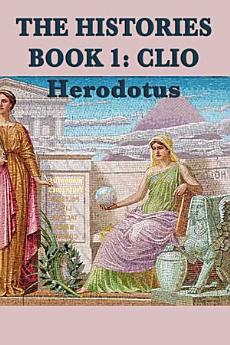The Histories Book 1: Clio
нояб. 2012 г. · Simon and Schuster
5,0star
1 отзывreport
Электронная книга
85
Количество страниц
family_home
Можно добавить
info
reportОценки и отзывы не проверены. Подробнее…
Об электронной книге
Herodotus was an ancient Greek historian who lived in the fifth century BC (c.484 - 425 BC). He has been called the "Father of History", and was the first historian known to collect his materials systematically, test their accuracy to a certain extent and arrange them in a well-constructed and vivid narrative. The Histories-his masterpiece and the only work he is known to have produced-is a record of his "inquiry", being an investigation of the origins of the Greco-Persian Wars and including a wealth of geographical and ethnographical information. The Histories, were divided into nine books, named after the nine Muses: the "Muse of History", Clio, representing the first book, then Euterpe, Thaleia, Melpomene, Terpsichore, Erato, Polymnia, Ourania and Calliope for books 2 to 9, respectively.
Оценки и отзывы
5,0
1 отзыв
Об авторе
Herodotus was the inventor of universal history. Often called the Father of History, his histories are divided into nine books named after the nine muses. A native of Halicarnassus on the coast of Asia Minor (modern Bodrum, Turkey), he traveled extensively, writing lively descriptions of the lands he saw and the peoples he encountered. Herodotus set out to relate the story of the conflict of the Greeks of his own time against the "barbarian" Asiatic empire of Achaemenid Persia. His long narrative, titled by modern convention The Histories, begins with the earliest traditions he believed reliable. It ends with a highly colored account of the defeat of the Persian emperor Xerxes and his immense army of slaves by a much smaller number of Greeks fighting to preserve their freedom. Herodotus wrote history, but his methods and assumptions were not those of a modern historian, and his work was unjustly rejected by his successor Thucydides as factually highly unreliable and full of inappropriate romance. By his own admission, Herodotus retold the stories of other peoples without necessarily believing them all. This allowed him total artistic freedom and control to create a picture of the world that corresponded entirely to his own view of it. The result is a picture of Herodotus's world that is also a picture of his mind and, therefore, of many other Greek minds during the period known as "late Archaic." During this period, the Greek mind was dominated by reason, the domain of the first philosophers and the observant and thoughtful medical theorists of the Hippocratic school. Traditional beliefs in the gods of Homer and in their Oracles, especially the Oracle at Delphi, also dominated during this period. The literary genius of Herodotus consisted in the art of the storyteller. The stories he chose to tell, and the order in which he told them, provide his readers with a total view of his world and the way in which the will of the gods and the ambitions of humans interacted to produce what is known as history. For this reason the ancient critic Longinus justly called Herodotus "the most Homeric of all authors." Like Homer, Herodotus strove to understand the world theologically---a goal that makes his work difficult for the reader to understand at first. But, in place of Homer's divine inspiration, Herodotus used his eyes and ears and wrote not poetry but prose. Rejecting what is commonly known as myth, he accepted instead "oral tradition" about remembered events. For example, although he believed that the Trojan War had been fought, he could not investigate it beyond what the poets had said. In his view this "ancient history" of the Greeks and the peoples of Asia was not like contemporary history, because the heroes of old who had created it were beings of a different and superior order who had had a different, direct, and personal relationship with the gods. In recognizing this distinction, Herodotus defined for all time the limits of the historian's discipline.
Оцените электронную книгу
Поделитесь с нами своим мнением.
Где читать книги
Смартфоны и планшеты
Установите приложение Google Play Книги для Android или iPad/iPhone. Оно синхронизируется с вашим аккаунтом автоматически, и вы сможете читать любимые книги онлайн и офлайн где угодно.
Ноутбуки и настольные компьютеры
Слушайте аудиокниги из Google Play в веб-браузере на компьютере.
Устройства для чтения книг
Чтобы открыть книгу на таком устройстве для чтения, как Kobo, скачайте файл и добавьте его на устройство. Подробные инструкции можно найти в Справочном центре.






